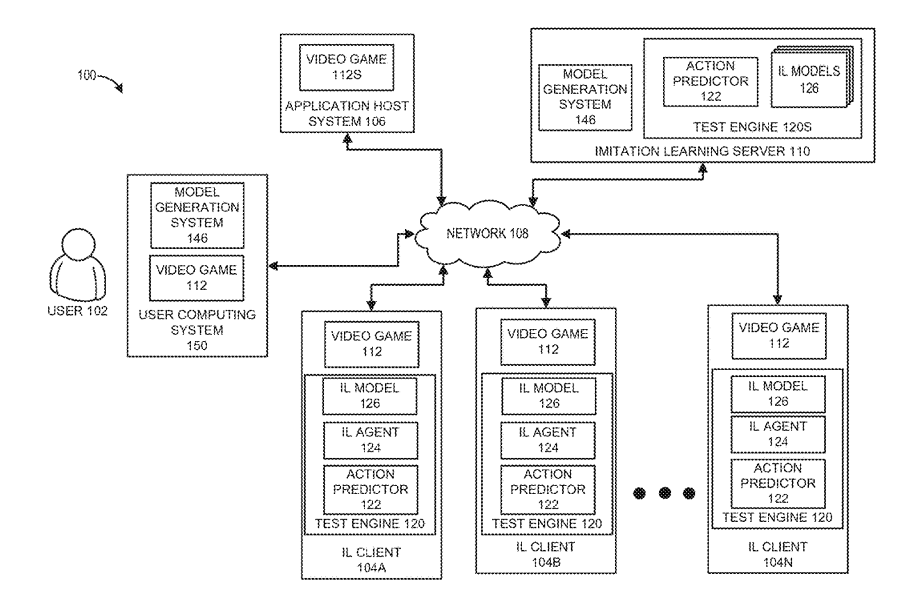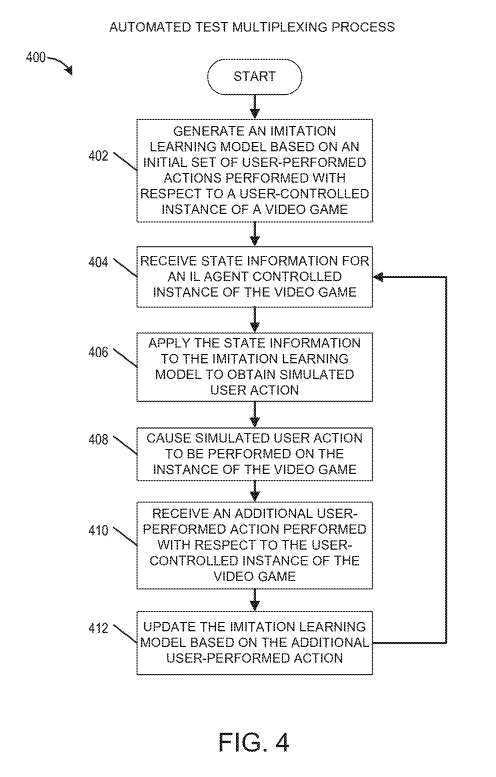Rundown:
- Electronic Arts is potentially working on a system to automate the testing of video games by observing a quality assurance (QA) tester or other player interacting with the video game and imitating them based on the corresponding state of the video game.
- The imitation learning system controls automated agents that can play additional video game instances simultaneously, allowing multiple tests to be performed simultaneously.
- The imitation learning system can also update the imitation learning model as it continues to interact with the video game, detect trigger conditions and perform remediation actions to improve the testing.
- The imitation learning system intends to improve the quality assurance (QA) testing process and facilitate video game developers in quickly and effectively testing multiple video game implementations with little resource usage.
Electronic Arts is one of the major players in the video game industry, with development studios around the world. Since its foundation in 1982, the company has developed and published some of the world’s most critically and commercially successful video game franchises, including FIFA, Battlefield, Mass Effect, and The Sims, with many more projects currently under development. With an ambition to deliver immersive and engaging entertainment experiences to players worldwide, it’s no surprise that Electronic Arts is constantly working on improving its existing video game development technologies and innovating forthcoming ones. In December 2022, the company made even more patents publicly accessible for video game developers as a part of its Accessibility Patent Pledge, which “provides competitors and developers with free access to accessibility-related patents and technology as part of EA’s ongoing commitment to positive play and to reducing or eliminating as many barriers to access as possible in video games.”
Only today, we came across a recently published patent from the company that describes a system for potentially generating dynamic animations for video games based on real-life videos using a neural network to extract rough motion data, such as pose information, from a frame (or frames) of a character in motion. However, it seems the company certainly has more that it’s currently working on to streamline video game development for companies and indie developers, and one of these possibly forthcoming video game development technologies is a system that utilises imitation learning methods to automate the testing of video games by observing a quality assurance (QA) tester or other player interacting with the video game, allowing for multiple tests to be performed simultaneously with little resource utilisation.
Earlier today, we found another recently published patent from Electronic Arts titled “AUTOMATED TEST MULTIPLEXING SYSTEM,” filed in August 2022 under Electronic Arts Inc. The patent, which was published earlier this week, describes an artificially intelligent system for automating the quality assurance (QA) testing of video games using imitation learning. The system learns how to play a particular video game by observing a quality assurance (QA) tester or other player interacting with the video game and develops an imitation learning model based on the player’s actions and the corresponding state of the video game. The imitation learning model is then used to control automated agents that can play additional video game instances simultaneously, allowing multiple tests to be performed simultaneously. The imitation learning model is also updated as the player continues to interact with the particular video game during testing so that the interactions of the automated agents with the video game over time imitate the player’s interactions, allowing the system to adapt to any changes or updates made to the video game during development.

“An imitation learning system may learn how to play a video game based on user interactions by a tester or other user of the video game. The imitation learning system may develop an imitation learning model based, at least in part, on the tester’s interaction with the video game and the corresponding state of the video game to determine or predict actions that may be performed when interacting with the video game,” reads the abstract for the patent. “The imitation learning system may use the imitation learning model to control automated agents that can play additional instances of the video game. Further, as the user continues to interact with the video game during testing, the imitation learning model may continue to be updated. Thus, the interactions by the automated agents with the video game may, over time, almost mimic the interaction by the user enabling multiple tests of the video game to be performed simultaneously.”
It’s worth noting that the company published a similar patent back in November 2021 titled “AUTOPLAYERS FOR FILLING AND TESTING ONLINE GAMES,” which discussed a similar method, but instead of an imitation learning system, it described an auto-player system that could potentially populate an online multiplayer video game with automated bots that may emulate an actual player to test it for new features or improvements before deployment for players to play. However, the patent was meant entirely for online multiplayer video games and discussed possibilities for the auto-player system to be used outside of quality assurance (QA) testing, such as to replace inactive players during an online multiplayer video game session. With the imitation learning system, it seems like Electronic Arts wants to primarily target video game developers and quality assurance (QA) testers that manually test video games for issues and improvements before their release to players to streamline the process using an artificially intelligent system that can facilitate them in doing so.
According to the claims made by the patent, the imitation learning system may be based on a set of test criteria, such as “a speed of execution, a difficulty level of the video game, existence of a bug or error in source code of the video game, a response to an action within the video game, or a state of the video game.” Additionally, the imitation learning system may also be able to simultaneously test different implementations of the video game, such as “a different configuration of the video game or a different version of the video game.” Hence, this could potentially diminish the need for redundant quality assurance (QA) testing, as the imitation learning system could efficiently test multiple implementations simultaneously “without user interaction with the video game.” The patent also consistently mentions, what it calls, an imitation learning (IL) agent, which is likely an automated agent that is controlled by the imitation learning model to imitate a quality assurance (QA) tester and interact with a particular video game for testing. The automated agent takes the actions that the imitation learning system predicts the quality assurance (QA) tester would take in a specific state of the video game. Hence, it can be thought of as a virtual player controlled by the imitation learning system, and its objective is to imitate the player’s actions.

Additionally, if an error or a problem is detected while the simulated actions are being executed, the imitation learning system could take a specific action to fix the problem as well, such as giving control of the video game back to the quality assurance (QA) tester or other player, recording information about the problem, or adjusting the imitation learning model accordingly. Adjusting the imitation learning model may be performed by changing the weight of certain states in it, thereby changing how often certain actions that actually led to the problem occur. The trigger condition that initiates the remediation action can be a threshold number of occurrences of a certain video game state, an error, or an unexpected state that is not included in the imitation learning model. Likewise, the imitation learning system may provide feedback to the quality assurance (QA) tester or other player accordingly based on the results and determine whether to continue or restart. Interestingly, the imitation learning system may also be able to control non-player characters (NPC) in the video game based on its execution and even determine a more resource-efficient version of the video game by measuring the resource usage of the computer system during the execution. After completing the quality assurance (QA) testing by the imitation learning model, it would generate a report including information about the execution of the video game, the identified bugs or errors, and the resource usage of the computer system during it all.
Of course, this is still a patent, and there’s no certainty whether this will actually be implemented or not, but the prospect of such an advancement in video game development definitely shows Electronic Arts’ commitment to innovation and pushing the boundaries of what is possible in the video game industry. The imitation learning system could be used by any video game developer to improve their quality assurance (QA) testing process, making it more efficient and, eventually, leading to better video games. However, whether that does happen or not, only time will tell.
What do you think about this? Do tell us your opinions in the comments below!
Similar Reads: EA Finding Way To Create Realistic Game Worlds Using Map Data
Good job! Please give your positive feedback 😏
How could we improve this post? Please Help us. 💡
From writing short stories in his room to finding true enthusiasm for video game and computer hardware journalism, Huzaifa plays video games and write all the latest and greatest news about them. Currently pursuing a Bachelor of Science degree in Data Science, he dives deep into the news, authenticating every tiny detail to serve his audience. When he’s not breaking news, he becomes a master storyteller, conjuring up captivating tales from the depths of his imagination. With a wealth of experience as a Video Game Journalist. He has also worked with Publishers like eXputer, The Nerd Mag and Gamesual making him an expert in Gaming News Industry.



